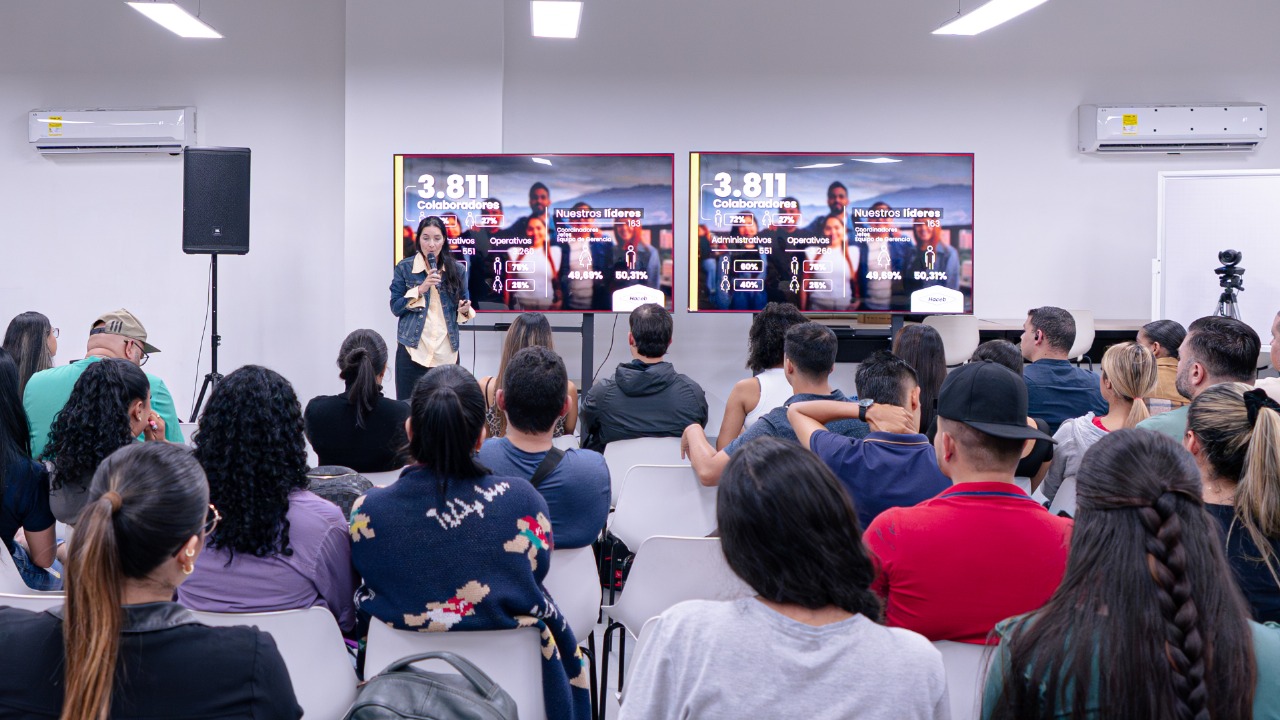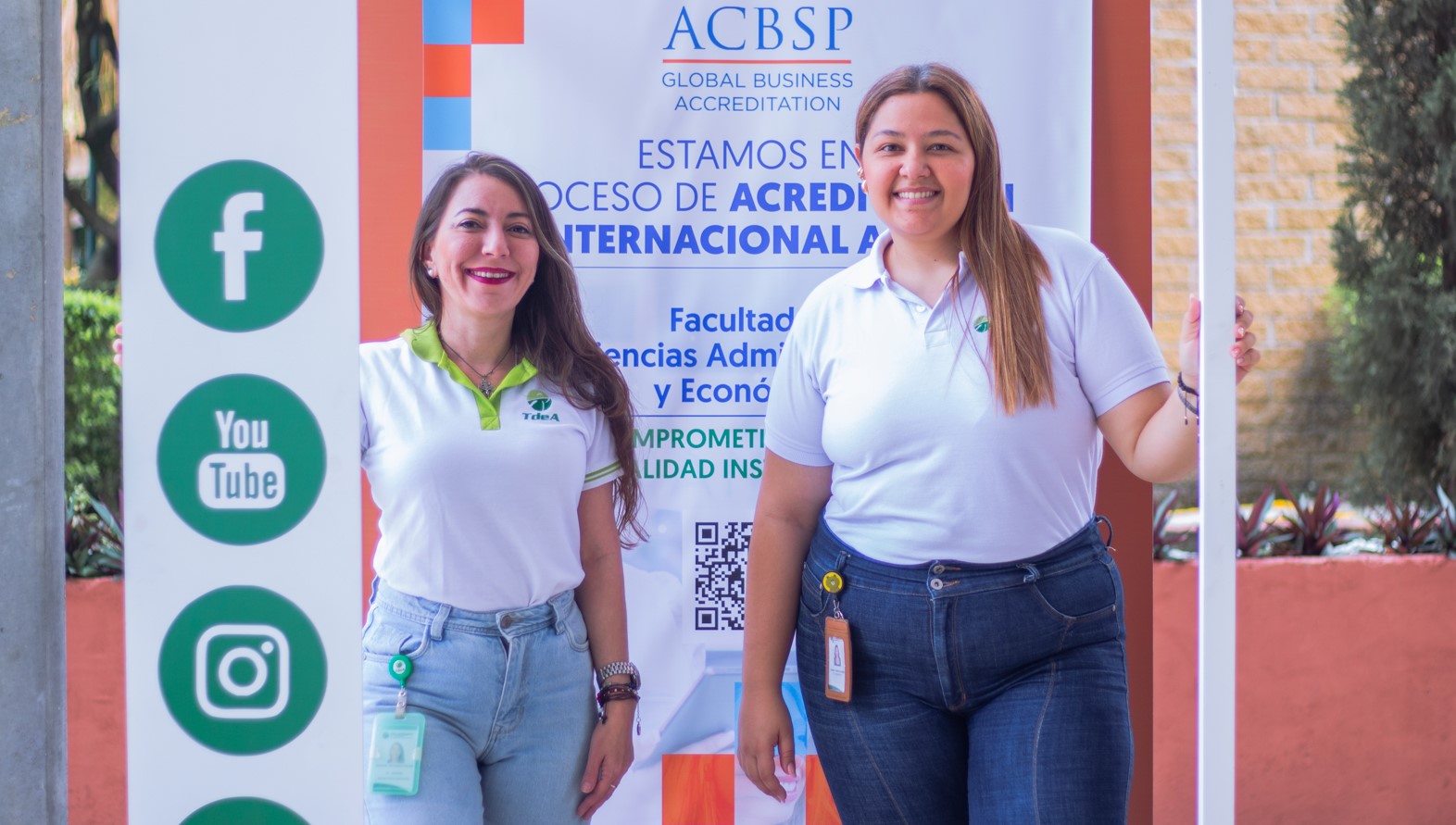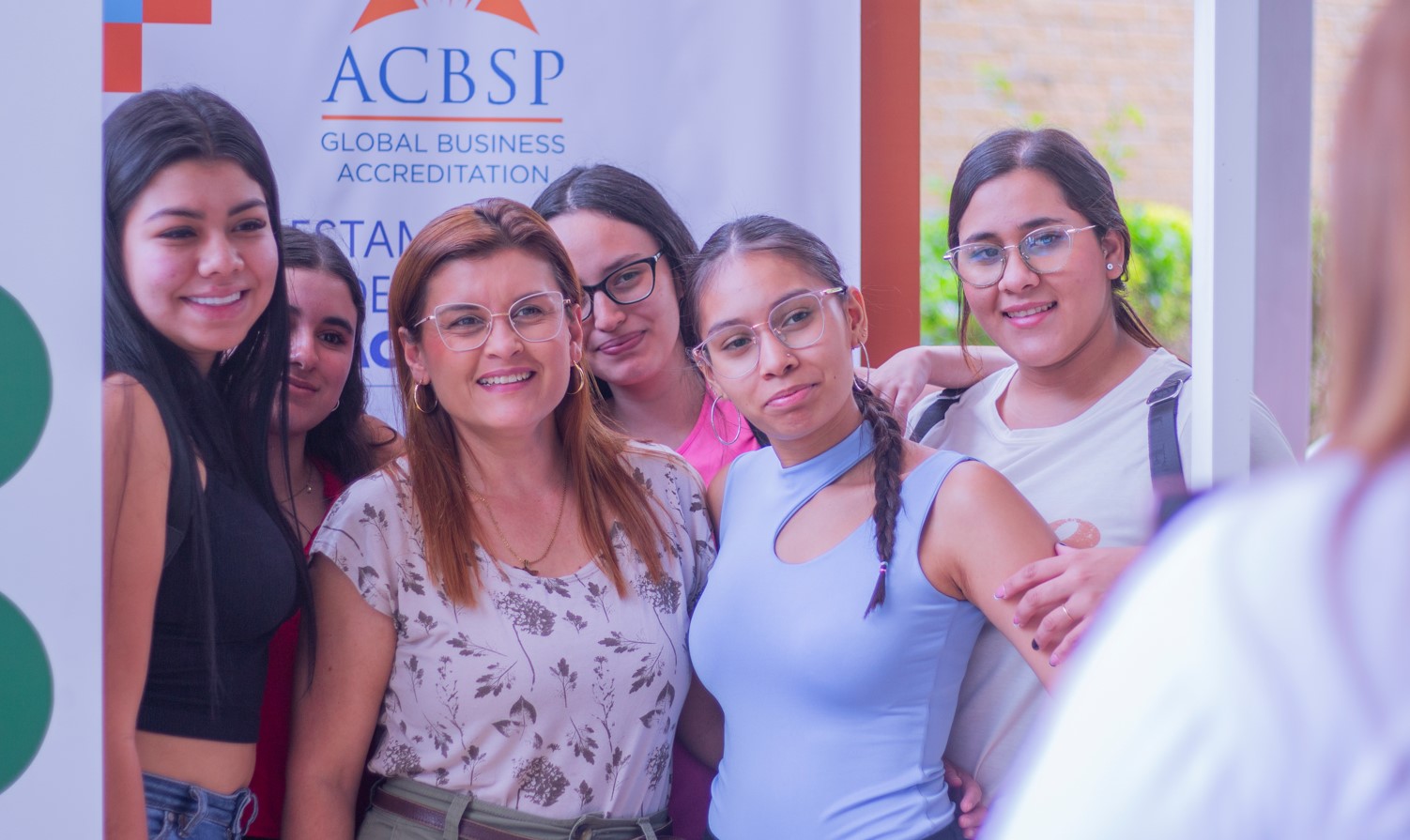Como preámbulo a la visita del Consejo de Acreditación para Escuelas de Negocios y Programas —ACBSP—, que tendrá lugar entre el 24 y 26 de septiembre, la Facultad de Ciencias Administrativas y Económicas organizó el Día de la Acreditación Internacional.
El 19 de septiembre, la comunidad TdeA vivió esta jornada desde 10:00 de la mañana hasta las 8:00 de la noche. Estudiantes, docentes y colaboradores conocieron de primera mano el propósito del proceso que encontrará su cierre con la llegada de la firma acreditadora al campus y del que se espera culmine con la acreditación internacional de los nueve programas de pregrado vigentes de la Facultad.
“Es una preparación para la visita y el objetivo es contarle a los estudiantes y docentes en qué etapa estamos”, explicó la profesora Carolina Múnera, quien lideró la jornada y hace parte del equipo inmerso en el proyecto que se inició en 2022.
En el Complejo Financiero y el bloque administrativo, los asistentes pasaron por cuatro estaciones donde se enteraron de cada paso en este camino, como la necesidad que originó la iniciativa, el autoestudio, los proyectos especiales y los beneficios que obtiene la institución, pero también cómo los incluye a cada uno en su rol.
“Es de los proyectos más importantes y retadores de la Facultad en los últimos años”, puntualizó la docente, quien agregó que esto se traduce en reconocimiento, visibilidad, movilización internacional y se llevan los programas a otro nivel. “Esta acreditación es muy importante porque seríamos la primera institución de educación superior de orden público en tener este reconocimiento”, es por esto que se hizo esta socialización, en una jornada extendida hasta la noche para que todos tuvieran oportunidad a acceder a la información. Cabe recordar que en 2023 se realizó la primera experiencia de este tipo, es un trabajo constante de la institución para que todos hagan parte de la acreditación.
En la visita, “todos ponen” y así lo han dejado ver en esta jornada, todos pueden aportar desde el conocimiento del proceso, para hacer esto posible se tendrán espacios en aulas y otros encuentros. En caso de obtener la acreditación, esta tendría una vigencia de 10 años, en los cuales el acreditador realizaría visitas periódicas de verificación cada dos años.
Este logro traería grandes beneficios. El primero sería la cualificación docente, pues los niveles de formación exigidos por el proceso mismo están en el doctorado. Las nuevas contrataciones han estado acordes a este requerimiento y la institución también definió un plan de cualificación para este proceso.
Viene de la mano entonces el fortalecimiento y la excelencia académica del estudiantado. Se suma a lo anterior las buenas prácticas compartidas por las universidades miembro, lo que representa un gran cúmulo de conocimiento, ya que la acreditación de la ACBSP trae consigo un gran impacto, por ser la tercera acreditadora más grande a nivel mundial en el área de negocios, tiene presencia en más de 60 países, con 1.100 universidades asociadas. “Estos nos ha permitido identificar aspectos por mejorar y nos ha funcionado, como el tema de resultados de aprendizaje, las mediciones de impacto”, detalló la docente.
El tamaño de la red de universidades también influye en la movilidad de la comunidad académica. Esto, igualmente, abre las oportunidades de articulación entre estas instituciones. Además, el reconocimiento global y el prestigio que se obtiene tiene repercusión en las carreras de los egresados.
Después de pasar por la feria, los asistentes quedaron convencidos de la importancia de la acreditación internacional, asentada además en el quinto proyecto estratégico del Plan de Desarrollo Ser Hacer Trascender 2022-2026.
“La verdad se dio una información muy clara. Por lo que veo la acreditación nos da unos beneficios muy buenos tanto a los estudiantes como a la institución. Muy bien con eso de que ´paso a paso vayamos avanzando’, ojalá sea posible. Sería interesante movilizarse en diferentes universidades, llevar nuestra carrera a un ámbito un poquito más amplio y pues que se den a conocer todo lo que los estudiantes del TdeA tienen para ofrecer en otras universidades”, opinó Abigail Herrera, estudiante de tercer semestre del Programa Técnica Profesional en Procesos de Comercio Exterior y Logística, quien además tiene perspectivas en la profesionalización.
“La acreditación es un proceso muy importante porque es el que mide el estándar de calidad con el que compiten las universidades en la actualidad. Ya todas están más o menos como estandarizadas en que el escenario de competencia se da desde la calidad y el proceso de acreditación es el que permite formalizar, dar fe de ese nivel”, indicó Yesid Carrillo, docente de la Facultad de Ciencias Administrativas y Económicas.
Con este panorama, se desarrolló el Día de la Acreditación Internacional en el TdeA, el abrebocas a la visita de la ACBSP, que en Colombia ha acreditado a la Universidad del Rosario, la Universidad Externado de Colombia y la Universidad Autónoma de Bucaramanga. En Latinoamérica se cuentan unas 70 en la lista, dentro de las que se encuentra la Universidad Nacional Mayor de San Marcos del Perú, la más antigua de América.
“Este es un reconocimiento al trabajo de años por parte de directivos, docentes, estudiantes, egresados y colaboradores, ser tenidos en cuenta para avanzar en este propósito por parte de una agencia como ACBSP, la tercera acreditadora más grande a nivel mundial en el área de negocios. El TdeA es la primera institución pública del país que podría obtener esta acreditación internacional”, indicó el rector del TdeA, Leonardo García Botero, al anunciar la entrega del certificado de candidatura por parte de la acreditadora el pasado mes de julio.
![]()
International Accreditation Day at the TdeA
As a preamble to the visit of the Accreditation Council for Business Schools and Programs (ACBSP), which will take place between September 24 and 26, the School of Administrative and Economic Sciences organized the International Accreditation Day.
On September 19, the TdeA community lived this day from 10:00 a.m. to 8:00 p.m. Students, professors and collaborators learned first-hand about the purpose of the process that will be closed with the arrival of the accrediting firm on campus and which is expected to culminate with the international accreditation of the nine current undergraduate programs.
"It is a preparation for the visit and the objective is to tell students and teachers what stage we are in," explained Professor Carolina Múnera, who led the day and is part of the team immersed in the project that began in 2022.
In the Financial Complex and the administrative building, the attendees went through four stations where they learned about each step on this path, such as the need that originated the initiative, self-study, special projects and the benefits that the institution obtains, but also how it includes each one in their role.
"It is one of the most important and challenging projects of the in recent years," said the professor, who added that this translates into recognition, visibility, international mobilization and takes the programs to another level. "This accreditation is very important because we would be the first institution of higher education of public order to have this recognition," which is why this socialization was made, in an extended day until the evening so that everyone had the opportunity to access the information. It should be remembered that in 2023 the first experience of this type was carried out, it is a constant work of the institution so that everyone is part of the accreditation.
During the visit, "everyone contributes" and so they have shown in this day, everyone can contribute from the knowledge of the process, to make this possible there will be spaces in classrooms and other meetings. If the accreditation is obtained, it would be valid for 10 years, in which the accreditor would carry out periodic verification visits every two years.
This achievement would bring great benefits. The first would be the teaching qualification, since the levels of training required by the process itself are in the doctorate. The new hires have been in accordance with this requirement and the institution also defined a qualification plan for this process.
Thus comes the strengthening and academic excellence of our students. In addition to the above, the good practices shared by the member universities represent a great accumulation of knowledge, since the accreditation of the ACBSP brings with it a great impact, as it is the third largest accreditor worldwide in the business area, it has a presence in more than 60 countries, with 1,100 associated universities. "These have allowed us to identify aspects to improve and have worked for us, such as the issue of learning outcomes, impact measurements," explained the teacher.
The size of the university network also influences the mobility of the academic community. This, likewise, opens opportunities for articulation between these institutions. In addition, the global recognition and prestige obtained has an impact on the careers of graduates.
After passing through the fair, the attendees were convinced of the importance of international accreditation, also based on the fifth strategic project of the Development Plan Being Transcending 2022-2026.
"The truth is that very clear information was given. From what I see, accreditation gives us very good benefits both to students and to the institution. Very well with that 'step by step we are moving forward', hopefully it is possible. It would be interesting to mobilize in different universities, take our career to a slightly broader scope and then make known everything that TdeA students have to offer in other universities," said Abigail Herrera, a third-semester student of the Professional Technical Program in Foreign Trade Processes and Logistics, who also has prospects in professionalization.
"Accreditation is a very important process because it is the one that measures the quality standard with which universities currently compete. All of them are already more or less standardized in that the competition scenario is given from quality and the accreditation process is what allows formalizing, attesting to that level," said Yesid Carrillo, professor at the School of Administrative and Economic Sciences.
With this panorama, the International Accreditation Day was held at the TdeA, the appetizer to the visit of the ACBSP, which in Colombia has accredited the Universidad del Rosario, the Universidad Externado de Colombia and the Universidad Autónoma de Bucaramanga. In Latin America there are about 70 on the list, including the National University of San Marcos in Peru, the oldest in the Americas.
"This is a recognition of the work of years by directors, teachers, students, graduates and collaborators, to be taken into account to advance in this purpose by an agency like ACBSP, the third largest accreditor worldwide in the business area. The TdeA is the first public institution in the country that could obtain this international accreditation," said the TdeA’s president, Leonardo García Botero, when announcing the delivery of the candidacy certificate by the accreditor last July.







